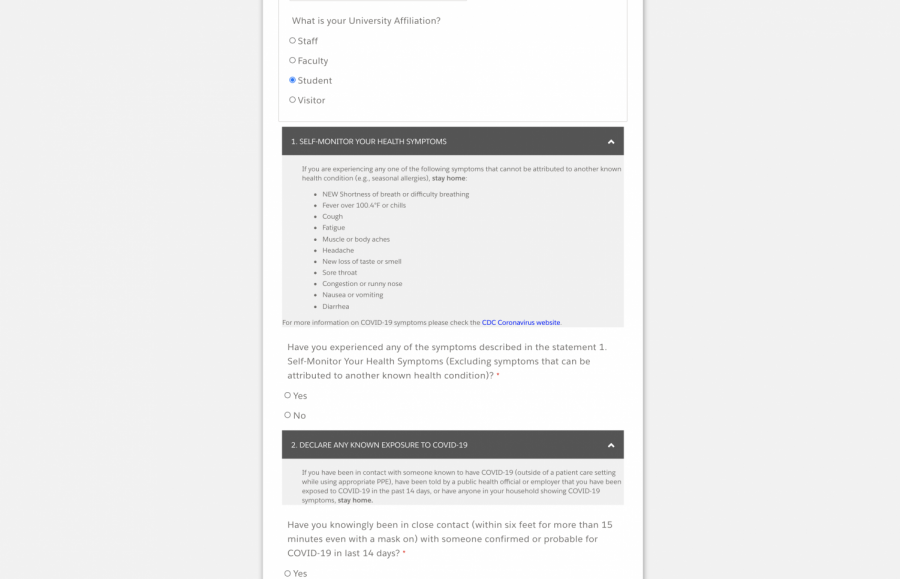Pitt says 85% of students have completed mandatory health and safety training
Screenshot via https://pittforms.tfaforms.net
Students living on and off campus were required to complete a daily health check during their 14-day shelter in place.
September 2, 2020
About 85% of Pitt students have completed the mandatory health and safety training as of Aug. 26, according to University spokesperson Kevin Zwick. He said the remaining 15% risk losing access to University IT services and campus buildings.
The training included a 30-minute training video explaining basic COVID-19 precautions. It mentioned recommended behaviors, including wearing a mask in public spaces, seeking medical help when sick, following social distancing guidelines, refraining from unnecessary travel, participating in contact tracing and following proper protocols for in-person gatherings such as parties.
Pitt required students to watch the health and safety training video by Aug. 10 if living on campus and Aug. 23 if living off campus, according to Kenyon Bonner, the vice provost and dean of students. All students were also required to acknowledge a student-generated community compact that included similar precautions.
In addition to the health and safety video, students living on campus had to use Pitt’s daily COVID-19 health check website to log their symptoms for seven days before and after they moved into housing. Students living off campus were also required to use the app everyday during their 14-day shelter in place. All students were asked to shelter in place for seven days before and after arriving in Oakland, but the University did not track the requirement.
Zwick said since the launch of the app on Aug. 4, only about 5,600 students completed the app’s questions on a daily basis.
But some students are unsure of the video’s effectiveness. Kayla Watson, a first-year environmental studies major, said while she watched the video, there was no accountability for students or way to know if students understood the information being presented.
“I think it keeps the community somewhat accountable, but it being virtual, I know people were able to fulfill the requirement even if they didn’t pay attention to it,” Watson said. “It wasn’t stressed enough, in my opinion, and there weren’t any questions afterward to see who remembered the information from the video.”
Watson pointed out that not all students are as willing to follow the rules as Pitt believes they may be.
“For the most part, people are staying safe, but I’m also seeing some students that are going out and partying or being in large groups without masks, like on social media,” Watson said. “But I feel like that’s inevitable, especially with college students.”
A new code violation regarding health rules was recently added to the Student Code of Conduct. It said that a student who “fails to comply with guidance set forth by the University, federal, state and/or local authorities regarding public health and/or safety” may be sanctioned.
Pitt added 46 new COVID-19 cases on Monday, composed entirely of students. The University has had a total of 96 students and 26 employees test positive since June 26. This comes in the wake of Pitt temporarily suspending nine Greek life organizations — a quarter of all chapters active before the pandemic — for alleged conduct violations. Pitt has also placed eight students on temporary persona non grata status, barring them from entering University buildings or property.
Student Government Board President Eric Macadangdang said content from the video — like many points included in the community compact he helped create — are difficult to measure.
“We have acknowledgements that we respect our peers and make sure we’re not stigmatizing against any race or ethnicity about the cause of the pandemic,” Macadangdang said. “But there are things in here that literally cannot be measured. Surveying students about mask-wearing or doing counts around campus is one idea to have some quantitative data.”
Macadangdang also said he is trying to make the University hear student opinions.
“Something we’re talking about in SGB is how we can be effectively surveying students to get a feel as to where students are in terms of comfort level and in terms of feeling like they are being supported by the University,” Macadangdang said. “If students are not satisfied in terms of the virtual nature, that’s important, since it may influence what the spring semester could potentially look like.”
He added that he hopes students are willing to come together as a group to reduce the likelihood of infections on campus.
“I’m very optimistic that the positive peer pressure can help promote good behaviors among a lot of the students,” Macadangdang said. “Unfortunately, there are bound to be some who ignore guidelines, and there will be consequences. But it’s my hope that most students will acknowledge our responsibilities as a community.”
Contributed reporting by Benjamin Nigrosh.








